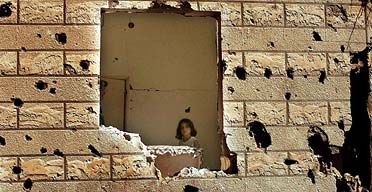 Clancy Chassay in Beirut, The Guardian, The Lebanese government is facing heavy pressure to resign over its handling of the war with Israel and the ensuing reconstruction effort, with almost seven out of 10 voters calling for early elections, according to a poll published today. The results come just over a week after Hizbullah leader Hassan Nasrallah called for the dissolution of the government and the formation of a national unity government, to the cheers of hundreds of thousands of Lebanese at a rally in Beirut’s southern suburbs.
Clancy Chassay in Beirut, The Guardian, The Lebanese government is facing heavy pressure to resign over its handling of the war with Israel and the ensuing reconstruction effort, with almost seven out of 10 voters calling for early elections, according to a poll published today. The results come just over a week after Hizbullah leader Hassan Nasrallah called for the dissolution of the government and the formation of a national unity government, to the cheers of hundreds of thousands of Lebanese at a rally in Beirut’s southern suburbs.
The poll, published by the Beirut Centre for Research and Information, indicates that more than 70% of the country supports the formation of a new national unity government with 68% calling for early elections. The director of the centre, Abdo Saad, says the calls for a national unity government reflect a popular desire to bridge the polarisation that has existed in the country since the Syrian withdrawal from Lebanon in March this year. "The results suggest people feel a national unity government would be the best way of bridging the divisions in the country and stabilising the situation here," he said. According to Paul Salem, director of the newly established Carnegie Middle East Centre in Beirut, the credibility of prime minister Fouad Siniora’s government was dealt a heavy blow by what was commonly perceived as an American sanctioned war.
The main ally of the Siniora government was the Americans and they didn’t seek to end the war but in fact sought to prolong it. Certainly, what happened during the war really strengthened the hand of the government’s opponents; it allowed them to say, ‘look what your alliance has brought us’."
Only 32% of the country felt the government’s reconstruction effort had been acceptable.
According to Rami Khouri, who heads a thinktank at the American University of Beirut, the government’s failure to respond adequately was heightened by Hizbullah’s rapid aid distribution. "The government’s slow movement on the reconstruction made it look incompetent when compared to Hizbullah’s efficiency," he said.
Despite gaining only 34% backing in the poll, Mr Siniora would still be the most popular candidate for the premiership if early elections were to take place.
There is a common call among the country’s multifarious opposition for greater representation in cabinet by members of former president Michel Aoun’s Tayyar Movement, currently outside the government but allied with Hizbullah.
Mr Aoun, a former army general who fought a battle at the end of the civil war to drive the Syrian regime out of Lebanon before fleeing to Paris, returned to the country following the Syrian withdrawal last March.
According to the poll he is the country’s most popular candidate for president, with more than 45% of the national vote. The next most popular candidate had just over 10% of the national vote.
Mr Aoun is also the most popular candidate for the presidency among the Christian community despite coming under criticism from some in his constituency earlier in the year for his decision to form an alliance with the Shia Islamists of Hizbullah.



